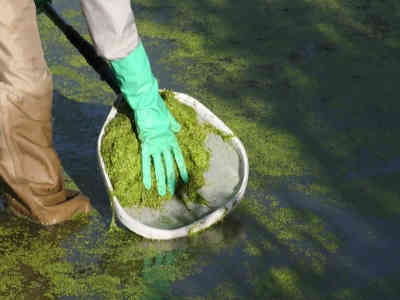By Tim Schley
With a $1.7 million grant from the National Science Foundation, Penn State researchers will investigate how duckweed could be grown on Pennsylvania farms to limit nutrient pollution into the Chesapeake Bay.
Duckweed, a tiny plant resembling a lily pad, grows rapidly in water with elevated levels of nitrogen and phosphorus, often the result of fertilizer and manure runoff. While many consider the plant a pest, farmers may find duckweed doubly beneficial, according to Rachel Brennan, associate professor of environmental engineering and lead investigator of the project.
“Not only can duckweed capture the nutrients before they cause problems like algal blooms and dead zones, but it can also ‘upcycle’ those nutrients into something that farmers can use again,” Brennan said. “It can be harvested multiple times per week and used as a feed supplement for farm animals. We have also demonstrated that it can be used as a soil amendment to support crop growth with much less runoff than conventional fertilizer. Duckweed has enormous potential for taking a waste product and giving it greater value.”
In a preliminary assessment, Brennan’s team calculated an estimated economic return for farmers if they repurposed some of their land from growing soybeans — often used for cattle feed — into a pond to grow duckweed. By mixing manure with water in the pond instead of applying it to an open field, farmers could not only reduce waste but also produce more protein.
“Soybeans contain an enormous amount of protein, but they do not grow very quickly,” Brennan said. “Duckweed’s protein content is high and so is its growth rate, so it has a higher yield. Given the same area, you can produce more protein if you switch to this little aquatic plant.”
In the four-year project, a multidisciplinary series of experiments will evaluate both the environmental and economic benefits of the team’s duckweed proposal. Co-investigators on the project include Lauren McPhillips, assistant professor of civil and environmental engineering and agricultural and biological engineering; Wayne Curtis, professor of chemical engineering; Alexander Hristov, distinguished professor of dairy nutrition; and Christine Costello, assistant professor of agricultural and biological engineering.

Considered a pest by many pond owners, duckweed is a "hyper accumulator" that helps to filter nutrient pollution. However, the plant must be removed from the water prior to decomposition to reap the benefits, according to Rachel Brennan, associate professor of environmental engineering.